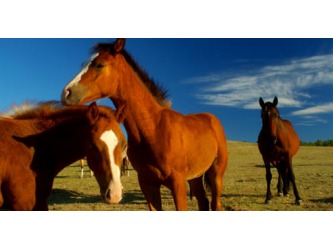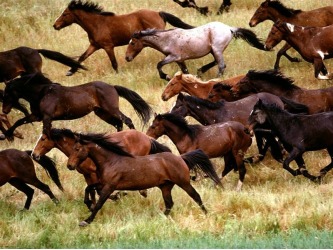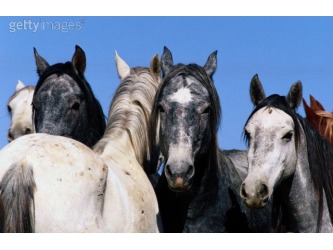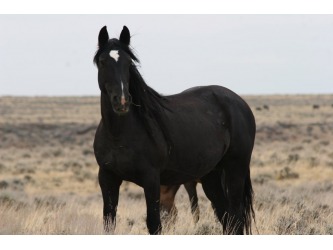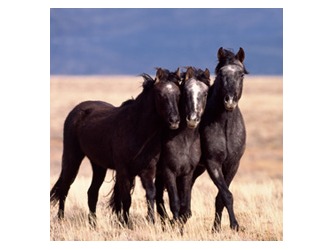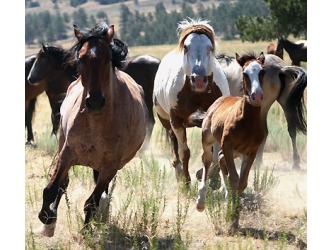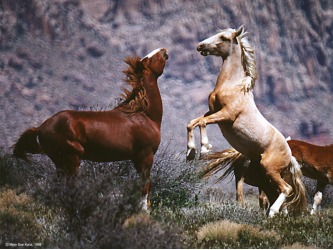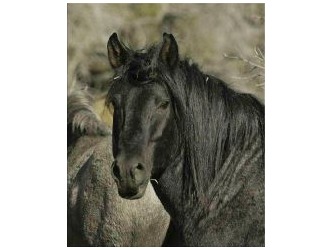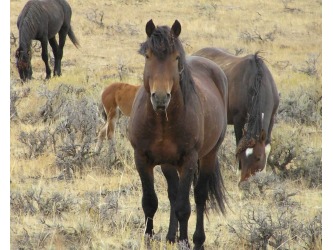What is a Mustang?
with photo gallery
The term "Mustang" refers to the wild horses that roam the ranges of the western United States. The Mustang is not a breed but rather a mixture of many breeds that have co-mingled over many years. Swift, sure-footed, tough, and intelligent, Mustangs weigh from 600 to 1000 pounds and are well suited for the rugged conditions of life on the western ranges.
These wild horses are descendants of animals that escaped from or were released by Spanish explorers, ranchers, miners, soldiers, and Native Americans. In the mid-seventeenth century they numbered between two and four million. Today, only about 50,000 survive. This drastic reduction in their numbers was due in part to the "mustangers" who rounded up wild horses and sent them to slaughter.
After a nationwide grassroots effort to protect these magnificent creatures, Congress passed the Wild Free-Roaming Horse and Burro Act in 1971 which states: "..wild free roaming horses..are living symbols of the historic and pioneer spirit of the West; they contribute to the diversity of life forms within the nation and enrich the lives of the American people".
The Bureau of Land Management (BLM), an agency of the U.S. Department of the Interior that administers 264 million acres of public lands, was entrusted with the responsibility of preserving and managing the wild horse herds to maintain an ecological balance for the wild horse herds and to maintain an ecological balance with native wildlife and domestic animals grazing on western public lands.
But with so many millions of acres of public lands under its jurisdiction, the BLM needs assistance from private citizens and organizations to monitor the well-being of the wild horse herds and the rangeland they inhabit. For example, over the last thirty years many environmental changes have occurred that have adversely affected wild horse habitat.
In addition, the rangelands where Mustangs roam free have come under heavy attack by some who feel their personal survival is threatened as well as those who feel the wild horse is interfering with the grazing 'rights' of other types of animals on those same lands.
Report after report tells gruesome stories of wild horses that have been found dead. Some of these animals were shot, others poisoned, and still others died from thirst or starvation. Many experienced slow, agonizing deaths. This wanton slaughter and destruction of a national resource cannot be allowed to continue.
with photo gallery
The term "Mustang" refers to the wild horses that roam the ranges of the western United States. The Mustang is not a breed but rather a mixture of many breeds that have co-mingled over many years. Swift, sure-footed, tough, and intelligent, Mustangs weigh from 600 to 1000 pounds and are well suited for the rugged conditions of life on the western ranges.
These wild horses are descendants of animals that escaped from or were released by Spanish explorers, ranchers, miners, soldiers, and Native Americans. In the mid-seventeenth century they numbered between two and four million. Today, only about 50,000 survive. This drastic reduction in their numbers was due in part to the "mustangers" who rounded up wild horses and sent them to slaughter.
After a nationwide grassroots effort to protect these magnificent creatures, Congress passed the Wild Free-Roaming Horse and Burro Act in 1971 which states: "..wild free roaming horses..are living symbols of the historic and pioneer spirit of the West; they contribute to the diversity of life forms within the nation and enrich the lives of the American people".
The Bureau of Land Management (BLM), an agency of the U.S. Department of the Interior that administers 264 million acres of public lands, was entrusted with the responsibility of preserving and managing the wild horse herds to maintain an ecological balance for the wild horse herds and to maintain an ecological balance with native wildlife and domestic animals grazing on western public lands.
But with so many millions of acres of public lands under its jurisdiction, the BLM needs assistance from private citizens and organizations to monitor the well-being of the wild horse herds and the rangeland they inhabit. For example, over the last thirty years many environmental changes have occurred that have adversely affected wild horse habitat.
In addition, the rangelands where Mustangs roam free have come under heavy attack by some who feel their personal survival is threatened as well as those who feel the wild horse is interfering with the grazing 'rights' of other types of animals on those same lands.
Report after report tells gruesome stories of wild horses that have been found dead. Some of these animals were shot, others poisoned, and still others died from thirst or starvation. Many experienced slow, agonizing deaths. This wanton slaughter and destruction of a national resource cannot be allowed to continue.

